In this section you will find more information about the WISER project, its progress and results.
The section is organized into four areas:
Deliverables - This area contains the results of the WISER's research & development efforts in form of public deliverables, showing the progress of the project work.
Presentations - This area contains public presentations held by the WISER representatives in different events, such as conferences, webinars etc.
Publications - This area provides a list of publications produced by the consortium and related to the work developed within the project.
Reports - This area contains different public studies and reports on cyber security.
D6.4 Communication & Stakeholder plan, Second iteration version
D6.4 Communication and Stakeholder Plan, 2nd Iteration Version is the second of 3 versions of the plan for communication, dissemination and stakeholder engagement activities of the CYBERWISER.eu, under Work Package (WP)6 (“Communication, community development, policy & go-to-market”). This updated plan refers to the period March 2020 – February 2021.
D6.1 Communication & Stakeholder plan, first version
The present document presents the first of 3 versions of the plan for communication, dissemination and stakeholders engagement activities of the CYBERWISER.eu.
Moving from the project objectives, the strategy for communication and stakeholders engagement (WP6, “Communication, community development, policy & go-to-market”) is defined for the period December 2018 – February 2020. In particular, a drill-down on the stakeholder groups and channels utilised is enclosed.
D5.1 – General Requirements and Guidelines
This deliverable is the output of Task T5.1 entitled “General Requirements and Guidelines for application to Pilots” within WP5 entitled “Piloting”. Task 5.1 started in Month M7 (March 2019) and will end in Month M12 (August 2019). Deliverable D5.1 is due in M12 (August 2019).
This document provides the specifications of the three full-scale pilots, one in academia and two in critical infrastructures, namely transportation and energy. Specifications will guide the realization of the pilots on the CYBERWISER.eu platform.
D4.4Training Material, Final Version
This deliverable presents the final version of the training material provided in CYBERWISER.eu. This deliverable describes our systematic approach to develop the curriculum, coursesincluding coursetemplates, as well asthe training material. The method consists of fourmain steps:
- Step 1: Identify target-user roles and skills to be trained via CYBERWISER.eu
- Step 2: Map the roles and their expected skills to the learning path of CYBERWISER.eu
- Step 3: Describe courses using predefined templates
- Step 4: Develop training material for the courses
D4.3 Cyber-training scenarios and scenario development method, initial version
This deliverable is the output of Task T4.2 “Cyber-training scenarios and scenario development method”. The Task started at M4 (December 2018) and will end at M24 (August 2020).
This task is part of WP4 entitled “Training material, scenarios and evaluation”, whose objectives are:
• Provide training material for developing/selecting risk models and real-time assessment and response proposal algorithms tailored to client needs, as well as for cyber-range testing and validation of such algorithms.
D4.1 Training material, initial version
This deliverable presents the initial version of the training material provided in CYBERWISER.eu. This deliverable describes our systematic approach to develop the curriculum, courses including course templates, as well as the training material. The method consists of four main steps:
• Step 1: Identify target-user roles and skills to be trained via CYBERWISER.eu
• Step 2: Map the roles and their expected skills to the learning path of CYBERWISER.eu
• Step 3: Describe courses using predefined templates
• Step 4: Develop training material for the courses
D2.5 Platform Design, Final Version
This deliverable is the final output of Task T2.2, entitled “Overall Vision and Design”. It reports the work done during the whole task timeline (M3-M12, November 2018 – August 2019). Although it builds on top of deliverable D2.3, it is a self-contained document and the reader does not need to refer to D2.3 at any point. The design of the CYBERWISER.eu Platform consists of an architecture based on a set of components working together to provide a cyber range platform. The interfaces between the different components are described, remarking which components provide or consume them.
D2.3 Platform Design, Initial Version
This deliverable is the first output of Task T2.2 entitled “Overall Vision and Design”. It reports the work done during the initial stage of the design of the platform (M3-M6 [November 2018 – February 2019], being the final one the period M7-M12 [March 2019 – August 2019]). The design of the CYBERWISER.eu Platform consists of an architecture based on a set of components working together to provide a cyber range platform. The components of the platform are presented, and their role explained. The interfaces between different components are described, remarking which components provide or consume them.
First CYBERWISER.eu Open Pilots Workshop: Post-event report
The first CYBERWISER.eu Open Pilots Workshop took place in Pisa on November 5 and attracted representatives from 12 organisations interested in testing the platform and presenting their individual training requirements to the expert panel comprising both CYBERWISER.eu project partners and invited guests from the four European Competence Centre Pilot Projects.
D8.3 - PRACTICAL TOOLS FOR ASSESSING THE SOCIO-ECONOMIC IMPACT OF RISK MANAGEMENT IMPLEMENTATION FOR CYBER SECURITY, FINAL VERSION
The overall aim of D8.3 is to show the pragmatic approach that WISER is taking to cyber risk management as an essential asset for businesses and public-sector organisations that depend on IT/computer software for their core business, operational efficiency, or added-value services.
Specifically, D8.3 reports on the final development of CW-SEIT.
D5.2 - WISER REAL-TIME ASSESSMENT INFRASTRUCTURE
This deliverable documents the implementation, deployment and operation of the Real-Time Assessment Infrastructure. It is composed of three modules, namely: 1) The Risk Assessment Engine; 2) The Data Warehouse and 3) The Decision Support System.
The document provides an overview of the modules and then goes deeper into the description of each of them and how they interplay with the rest of the Framework.
Implementation of the Network and Information Security (NIS) Directive - ETSI
ETSI, the European Telecommunications Standards Institute, has recently published a new report on implementing the NIS Directive which lays down measures for a high common level of security of network and information systems across the European Union.
D8.6 Communication Plan, final version
This document is the final version of the Communication Plan, covering the actions and impact for the period May 2016 to May 2017 and the plans for the last 6 months of the project (June-November 2017) as part of an all-partner commitment to communicating WISER and disseminating its results to the diverse audiences targeted.
This plan is now the focus of WP8 based on three pillars namely a complete product range for major marketing campaigns, portability to other verticals for verification (Manufacturing, Transportation, ICT, Healthcare and connected devices, Public Administrations) in addition to a wide pool of SMEs that also but not only operate in these verticals and a business model to be tested.
Release: June 2017
ENISA Annual Incident Reports 2016
For the sixth year, ENISA publishes the annual report about significant outage incidents in the European electronic communications sector.
The WISER project at a glance
This presentation was held by Antonio Alvarez Romero (ATOS) during the 1st CIPSEC Workshop in Vilanova i La Geltrú (Spain) on 14 June 2017.
The presentation gives an overview of the WISER project and shows how the CyberWISER Light, CyberWISER Essential and CyberWISER Plus are different from the other cybersecurity services present in the market today.
WISER: Helping EU firms get smart about cyber security
The presentation focus on cyber risk management from a business point of view by considering all the business implications of a breach, from business interruption to reputational damage.
Cyber security - Ensuring business is ready for the 21st century
The IoD report, "Cyber security: Ensuring business is ready for the 21st century" supported by Barclays, shows that despite a number of high-profile cyber-attacks over the last year, more than a third (37%) of IoD members lead or work in organisations without a formal cyber security strategy, and worse still, in the event cybercrime was to hit their business, 40% would not know who to report it to.
Gaps in NIS standardisation
The aim of the study is to provide a mapping of the technical requirements of the NIS Directive to existing standards, to identify gaps and overlaps in related standardisation and provide recommendations for the future work in this area.
The report identifies a relatively small number of gaps and areas of overlap in standardisation where there is no clear best practice to be adopted partly due to the diversity of the current standardisation ecosystem. This allows for several recommendations:
Cyber threat to UK business - NCSC & NSA report
In their first joint report, the National Crime Agency (NCA) and the National Cyber Security Centre (NCSC), say that cyber crime is becoming more aggressive.
The rise of Internet of Things (IoT) devices gives attackers more opportunity. Consumer goods and industrial systems combined with the ever increasing commercial footprint online provides threat actors with more attack vectors than ever before.
Cisco Report Reveals Business Impact of Cyber Security
According to the CISCO 2017 Annual Cybersecurity Report, over 20% of organizations hit by data breaches last year experienced lost revenue, customers, missed or lost business opportunities.
The report revealed the potential financial impact of attacks on businesses, from enterprises to SMBs.


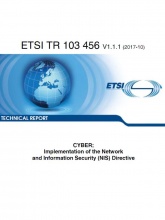
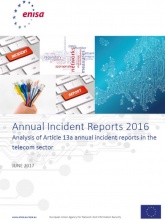


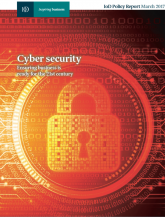
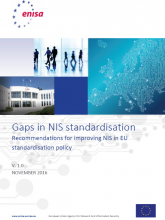

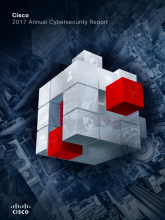
 © Copyright 2021 - CYBERWISER.eu has received funding from the European Union’s Horizon 2020 research and innovation programme under the Grant Agreement no. 786668. The content of this website does not represent the opinion of the European Union, and the European Union is not responsible for any use that might be made of such content.
© Copyright 2021 - CYBERWISER.eu has received funding from the European Union’s Horizon 2020 research and innovation programme under the Grant Agreement no. 786668. The content of this website does not represent the opinion of the European Union, and the European Union is not responsible for any use that might be made of such content.